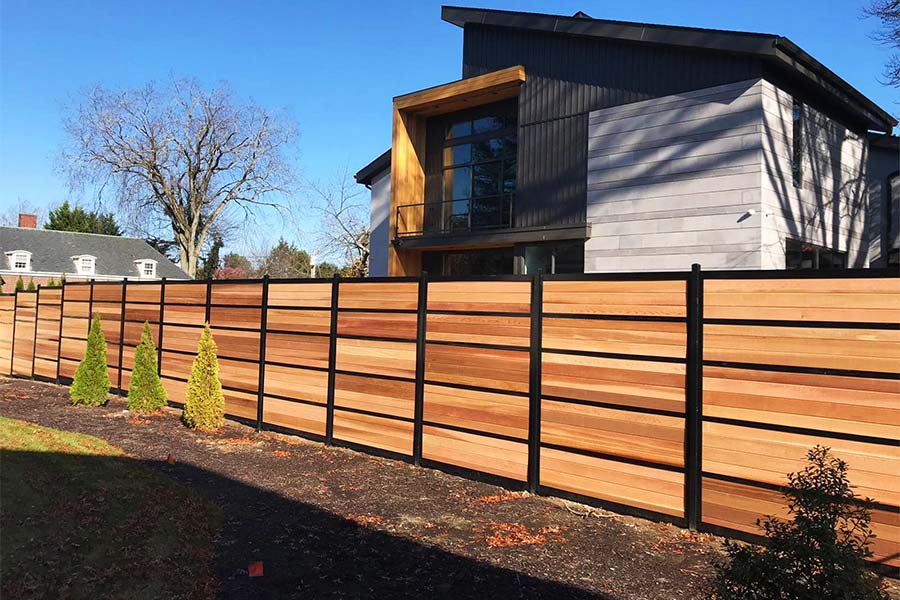All Categories
Featured

When mounting a fencing, choosing the ideal material is vital to stabilizing functionality, aesthetic appeals, and budget. Timber, plastic, and aluminum are amongst the most frequently selected fencing materials, each with its staminas and downsides. This guide explores the pros and cons of these options to assist you make a notified choice.

Timber Fencing. Pros:. Natural Appeal: Wood's ageless beauty can improve any type of residential or commercial property with its traditional and warm appearance. Personalized: You can repaint, stain, or sculpt timber to fit your design preferences. Affordable: Wood fencing is at first much more budget-friendly contrasted to some various other materials. Ecologically Friendly: As a sustainable source, wood is naturally degradable and often thought about green. Disadvantages:. Maintenance-Intensive: Normal sealing, painting, or staining is called for to stop damages from climate and pests. Prone to Decay: Without appropriate care, timber can rot, warp, or crack gradually. Shorter Life-span: On standard, wood fencings last 10-15 years, depending on the type of timber and upkeep. Timber is an excellent choice for those that value looks and are ready to purchase routine upkeep to protect its look and toughness.
Vinyl Secure Fencing. Pros:. Low Upkeep: Vinyl requires minimal treatment-- just occasional cleaning with soap and water. Weather condition Resistant: It doesn't warp, rot, or yield to insect damages, making it highly sturdy in numerous climates. Long life: Plastic fences can last 20-30 years with little to no fixings. Design Selection: Available in a variety of textures, designs, and colors, including wood-like appearances. Disadvantages:. Higher Initial Price: Plastic fences are much more costly in advance contrasted to timber. Vulnerability to Cold: In very winter, vinyl can come to be prone and brittle to fracturing. Restricted Repair Options: Matching replacement panels can be challenging if damage takes place. Plastic fence is perfect for home owners searching for a lasting, low-maintenance option that supplies modern-day versatility.

Light Weight Aluminum Secure Fencing. Pros:. Rust-Proof: Aluminum withstands rust, making it an outstanding selection for damp or moist settings. Durable: Regardless of being lightweight, light weight aluminum is solid and can stand up to rough weather. Low Maintenance: It needs minimal maintenance, commonly just occasional cleaning. Long Life-span: Aluminum fencings can last years without substantial degeneration. Elegant Design: Often utilized for ornamental purposes, aluminum fence includes a sleek, advanced appearance to residential or commercial properties. Disadvantages:. High Preliminary Investment: Aluminum fences are among the pricier choices on the market. Less Personal privacy: The open designs common with aluminum fencing don't provide much personal privacy. At risk to Damage: While sturdy, light weight aluminum can dent if hit with adequate force. Aluminum is an outstanding option for property owners prioritizing aesthetic appeals and durability without calling for much upkeep.
Making Your Decision. When deciding in between wood, light weight aluminum, or plastic fence, consider your top priorities:
Timber fits those who appreciate a natural look and don't mind putting in upkeep initiative. Vinyl is the best alternative for those seeking a low-maintenance, weather-resistant service. Aluminum offers sleek style and resilient sturdiness however might do not have privacy. By meticulously evaluating these materials' functions, you can select a fencing that matches your residential property while fulfilling your visual and functional demands.
Latest Posts
Discover the Leading Auto Repair Discounts in Montclare, Chicago
Published May 24, 25
1 min read
Recognizing When Your Car Needs Skilled Vehicle Service at Montclare Auto Repair
Published May 24, 25
1 min read
How to Know When Your Car Needs Expert Auto Repair at Montclare Auto Repair
Published May 24, 25
1 min read
More
Latest Posts
Discover the Leading Auto Repair Discounts in Montclare, Chicago
Published May 24, 25
1 min read
Recognizing When Your Car Needs Skilled Vehicle Service at Montclare Auto Repair
Published May 24, 25
1 min read
How to Know When Your Car Needs Expert Auto Repair at Montclare Auto Repair
Published May 24, 25
1 min read